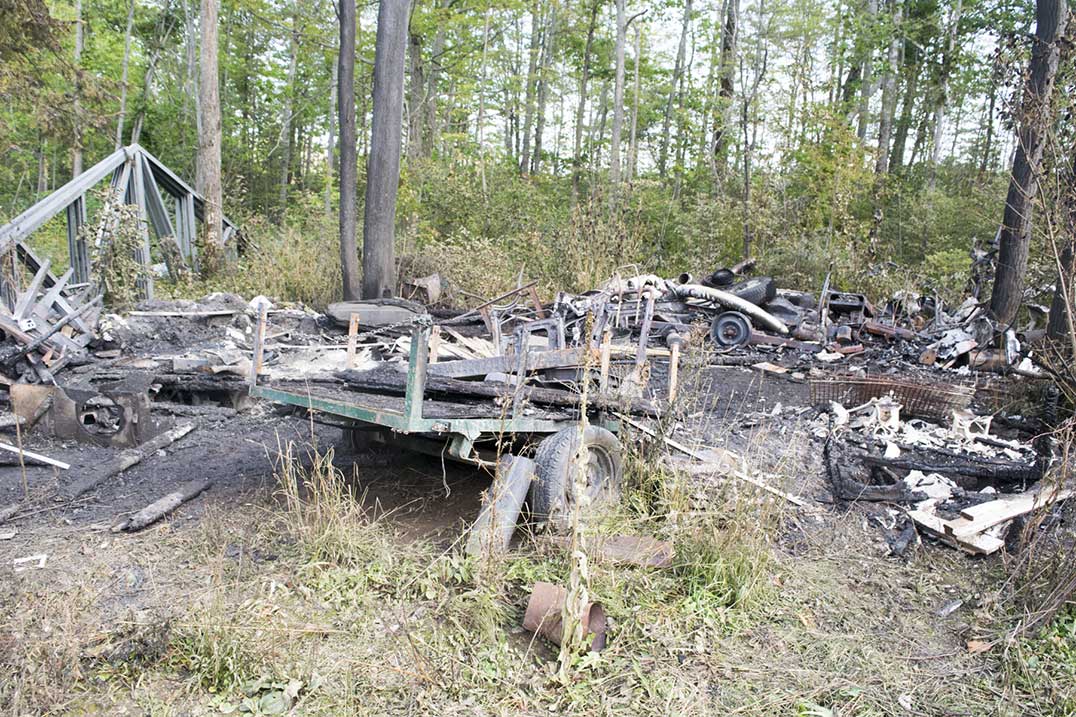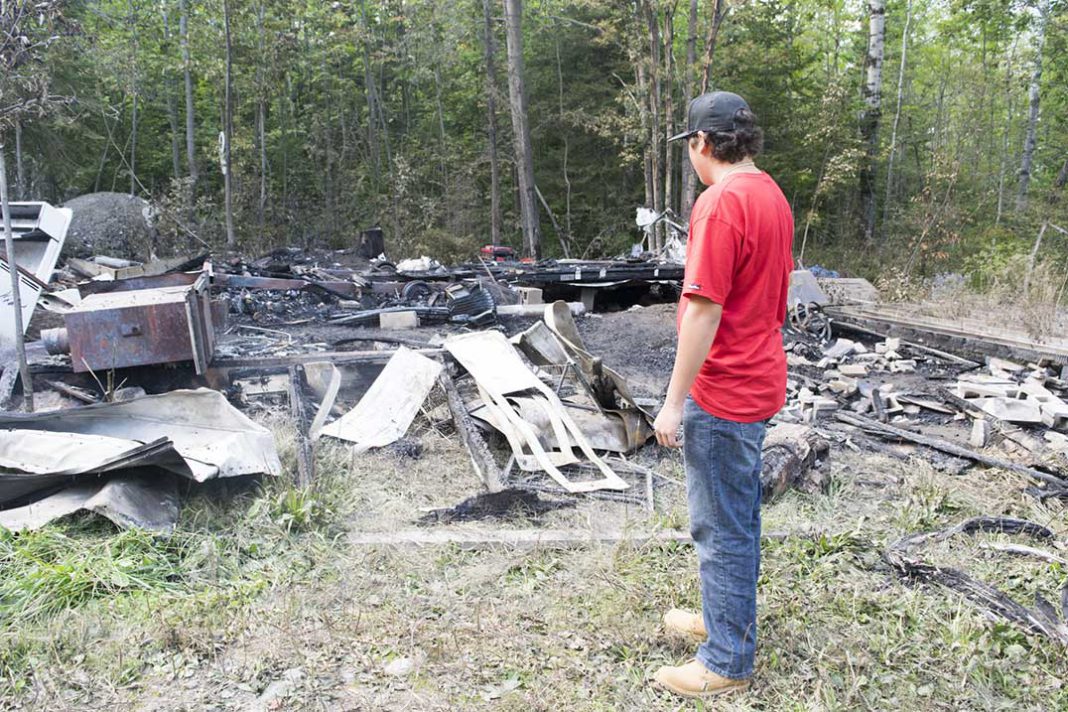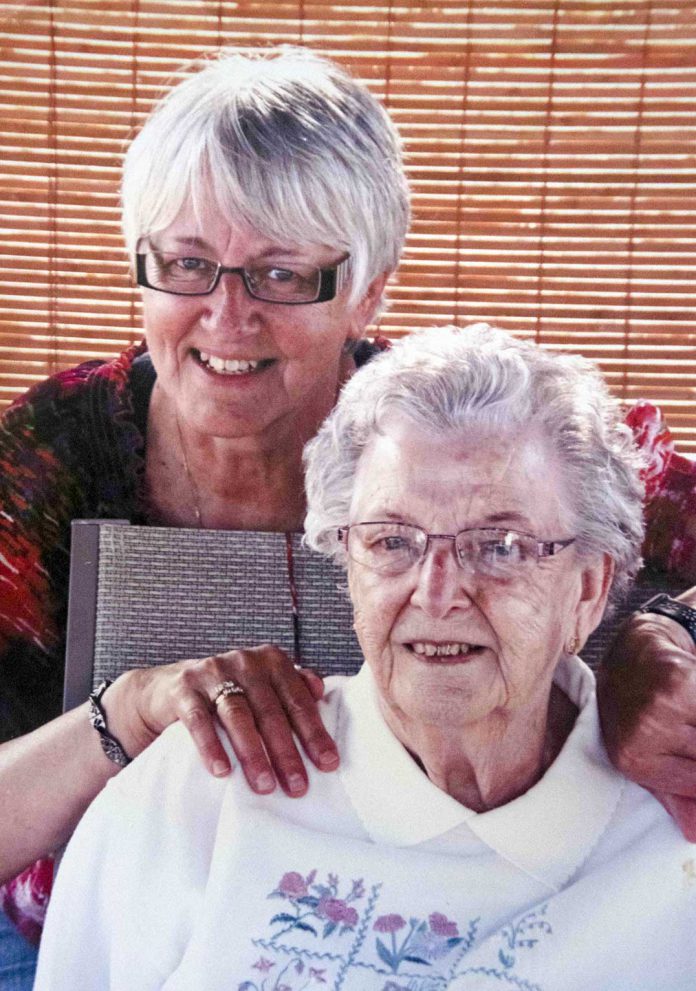SHEGUIANDAH FIRST NATION—Charred foundations are all that remain after a fire claimed two trailers, two sheds, an outhouse and building supplies in Sheguiandah First Nation on September 15.
This is not the first fire for the Waindubence-Doucette family, nor is it the second, or even the third. Since 2014, the family has lost a trailer, three vehicles, their house and now their camp at the southern end of the reserve. Kim Waindubence believes the fires that have continuously razed her property are arson.
“I believe it’s a race-related matter,” says Ms. Waindubence as she paces the floor in her brother Bryan Waindubence’s home. “After me and my husband got married, that’s pretty much when everything started to happen.”
“Jealousy,” interjects Mr. Waindubence, offering another possible motive. “People seeing my sister and Dave buying trailers, boats and, you know, just because they don’t have it doesn’t mean that you have to take it away from somebody else.”
Ms. Waindubence’s husband, David Doucette, is Acadian, hailing from New Brunswick.
Mr. Doucette has been in the news lately, but for other reasons. He is presently in Sudbury District Jail, charged with allegedly striking Sheguiandah resident Ruta Tribinevicius with his vehicle while intoxicated in July. Some reports have indicated that he then fled the scene.
The fires have been happening since long before that incident. Ms. Waindubence alleges his presence as a non-Indigenous person has caused a number of tensions on the reserve. According to her brother, Ms. Waindubence’s husband contributes a lot to the community.
“For the past three years, four years, they’ve been doing the feast at the powwow, and the last couple of years he’s had a pig roast,” says Mr. Waindubence. “It’s him and Kim really that do the feast so I don’t know why everybody’s so down on them.”
The Waindubences’ family and community support worker Jenny McGraw sits in the kitchen with Ms. Waindubence and her brother. She has been working in Sheguiandah First Nation for 25 years.
“This is my first experience with a family being ostracized within their own community,” she says.
“I agree with what Kim said, that there is a certain racial element to this. I mean, it’s pretty blatant at community meetings where they plainly say, ‘that white man.’ And that is racism,” says Ms. McGraw.
Chief Andrew Aguonie says it would not be unreasonable to suspect racial motives for the fire.
“I don’t know what it could be. (Racism) is a possibility for sure; it’s been coming to the forefront now. Racism is everywhere,” he says.

“The biggest thing is there is a lot of healing that has to happen. That’s the approach we’ve been taking now. We’ve been having community meetings, hearing from everybody and trying to educate as much as we can,” says Chief Aguonie.
“It’s really sad that they’re not factoring in that this is a family, and that there’s three children involved in this family. The harm they’re bringing by these actions, whoever it is that’s doing this, they’re causing trauma for this family. Big time trauma,” says Ms. McGraw.
Ms. McGraw says an alleged arsonist burning down their home once was bad enough, but describes the repeated incidences as “horrific.”
“You really have to think about the means behind the mind that did that. Is that person psychotic? Are they mentally ill? Are they intoxicated, were they doing drugs? Or is it just plain outright hate for non-Native people? Or is it, like Bryan (Waindubence) said, is it jealousy?” she asks.
Regardless of the root cause, the Waindubence family claims they have experienced a great deal of ill will within the community.
“It’s kind of hard knowing that almost everybody hates you,” says Ms. Waindubence’s 14-year-old son Joseph Waindubence-Doucette. Ms. Waindubence alleges she has been receiving harassing text messages since the fire.
“The safety is a big concern, as a worker in this community, for this family,” says Ms. McGraw. “We don’t know what’s going on in the mind of the individual that did that, and what is their next step.”
That thought weighs heavily on Ms. Waindubence.
“I honestly don’t want to stay here and have one of my kids—” Ms. Waindubence says without finishing her sentence. “By all means, that’s all I have left.”
“I don’t want my kids to grow up with hate, and that’s why I’m thinking maybe it’s just best to leave,” says Ms. Waindubence.
According to Ms. McGraw, people removing themselves from the community is not a new phenomenon. She says there are small hubs of people who have moved from the reserve to cities like Sault Ste. Marie or Sudbury and congregate together, where they often thrive and make a good life for themselves.
“They could not contend with the lateral violence in this community, and with that came the alcohol and drug issue,” says Ms. McGraw. “It’s sad because this is their home. They should be able to do that within the context of what is home to them.”
Ms. McGraw says she is encouraging Kim to stay within the community and not let “bullies” force her away from her home.
Ms. Waindubence and her family say they would like to see some action on this matter.
“I believe that this time they have a suspect, and it’s my hope that they definitely deal with this suspect,” says Ms. McGraw, noting police will need to find enough evidence to move forward.
Community Services Officer Murray Still of UCCM Tribal Police says the fire is still under investigation but considered suspicious. They do not have any suspects at this time. Officer Still says UCCM does not have any information that would indicate a connection between the family’s past fires and this most recent incident.
“For public safety and for all homes in the area, if anyone has information please come forward,” says Officer Still.
“I know (police action) is not going to bring anything of my sister’s back, but she’d have at least a little bit of closure,” says Mr. Waindubence. “Some of (what burned) was donations from the first fire. How heartless are you?”
To his credit, Ms. McGraw says Chief Aguonie is working on the problem.
“The chief, in my conversations with him, he certainly recognizes what is happening here. He knows that what is happening is wrong. He wants to be proactive and is attempting to be proactive, but you need the support of your council, and you need the support of the community,” says Ms. McGraw. “His heart is in the right place.”
Chief Aguonie says the band has yet to find a solution for the family.
“We’re trying to figure out some way to get them going and back on their feet. They have housing now but not where they’d prefer, where they feel secure,” he says. “We’re also looking at the possibility of putting up cameras and things of that nature; we’re trying to get the ball rolling on that.”
Ms. Waindubence, however, alleges council has not been helpful with any of her past fires.
“I haven’t seen any of them, I haven’t heard from any of them, and two of the council members are family members of mine,” she says. “It’s hard to put my faith into a community and an administration that doesn’t really give a damn, it seems like, and that’s sad.”
The July incident when Mr. Doucette had allegedly struck Ms. Tribinevicius with his vehicle only complicates matters. The family and Ms. McGraw both refer to it as ‘an accident.’ Mr. Doucette is currently in prison awaiting trial.
When that incident had occurred, Ms. Waindubence alleges, the band council was quick to react.
“That same night, they wrote a letter saying that they didn’t want him here,” she says.
Her son Joseph agrees, and says the action seems imbalanced compared to others.
“They’re trying to ban my dad from the rez for an accident and leaving people for full-on acts of aggression against other community members,” he says.
The strong reactionary measures Mr. Doucette faced from council is not surprising, according to Ms. McGraw.
“That’s what comes with lateral violence, is that reactionary behaviour,” says Ms. McGraw.
She says intergenerational trauma from the residential school system is a major underlying factor as well.
“These people are stuck in their addictions, in their substance use and in their emotion. And when do those emotions come out best? When they’re intoxicated, or when they’re under the influence, so you see behaviours that are quite bizarre.”
Chief Aguonie agrees that addiction is a systemic problem within the community.
“Number one thing, with everything, and the history that’s happened here, it all started with the drinking,” he says.
“The fact of the matter is, this community has a huge alcohol and drug problem, and it’s seemingly getting worse,” says Ms. McGraw.
Chief Aguonie says regulations are in place to ban alcohol and drug consumption in areas such as the powwow grounds with security on-site two days per week to monitor the situation.
“Council has been starting to address the zero tolerance to any public intoxication,” he says.
Ms. Waindubence claims she had tools such as a chainsaw in one of the sheds that had burned down, but police allegedly found no evidence of any tools being present, according to Ms. Waindubence. She says she suspects the place had been looted before it was lit on fire.
“Of course I’m angry. I’m angry at the whole situation. Nobody, really nobody cares. And that’s the sad part of it,” she says.
Officer Still asks anyone with information about the fire to contact UCCM at 705-377-7135 or Sudbury Rainbow Crime Stoppers at 1-800-222-8477.




